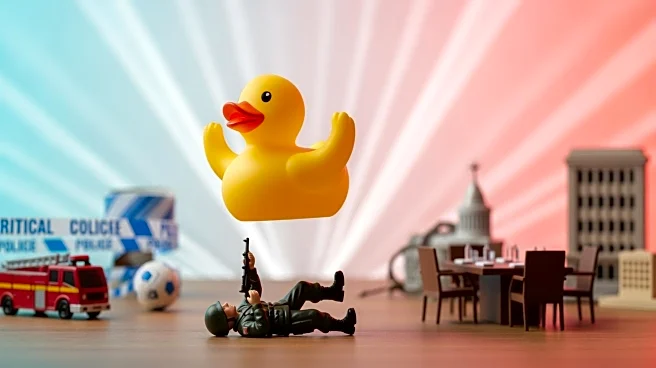What's Happening?
The indie game 'Escape From Duckov' has briefly surpassed the popular title Battlefield 6 in terms of concurrent players on Steam. Developed by the five-person team known as Team Soda, the duck-themed
parody of 'Escape From Tarkov' reached 152,207 concurrent players, outshining Battlefield 6's count of 129,729 during the same period. Since its launch, 'Escape From Duckov' has sold over 1 million copies in its first five days and peaked at 257,952 concurrent players. The game has gained popularity due to its unique theme and engaging gameplay, with recent updates adding mod support and discouraging unrealistic in-game actions.
Why It's Important?
The success of 'Escape From Duckov' highlights the growing influence of indie games in the gaming industry, challenging major titles like Battlefield 6. This trend underscores the potential for smaller development teams to achieve significant commercial success and impact player preferences. While Battlefield 6 has sold 7 million copies across various platforms, the rise of 'Escape From Duckov' demonstrates the competitive nature of the gaming market and the importance of innovation and creativity in attracting players. This development may encourage larger companies to explore new themes and gameplay mechanics to maintain their market position.
What's Next?
Battlefield 6 is set to begin its first season on October 28, with rumors suggesting a potential surprise launch of a battle royale mode. This could shift player interest back to Battlefield 6, as EA aims to enhance its offering and retain its player base. Meanwhile, Team Soda is likely to continue updating 'Escape From Duckov' to sustain its momentum and address player feedback. The ongoing competition between indie and major titles may lead to further innovations and strategic moves in the gaming industry, impacting future game development and marketing strategies.
Beyond the Headlines
The rise of 'Escape From Duckov' may influence the cultural perception of indie games, showcasing their ability to compete with established franchises. This could lead to increased investment in indie game development and a shift in consumer expectations towards more diverse and creative gaming experiences. Additionally, the success of such games may prompt discussions on the sustainability of small development teams and the challenges they face in scaling operations while maintaining quality and player engagement.









